Although the bands from the Detroit and Ann Arbor areas of Southeast Michigan have gotten the lion’s share of the attention, there was also a vibrant “garage rock” scene in Southwest Michigan that has unjustly been overlooked. Although none of these bands achieved national prominence, many of the groups recorded singles at local studios such as the Great Lakes Recording Studio in Sparta, Michigan, and Cinerama Sound and Midwestern Sound in Grand Rapids. Several of these singles became regional hits during the 60’s, and all of the original 45 rpm records are highly collectible today.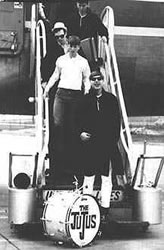 The JuJus
The JuJus
The thrill of growing your hair a little longer than most and playing rock and roll on stage was a powerful lure for the young men, and a few young women, who were part of the garage band scene. Being in a band bestowed almost instant “local celebrity status” to the participants, and that could be doubled or even tripled if you cut a record and got it played on any of the local Top 40 AM radio stations.
The JuJus were one of the most popular and successful of the teen bands emanating from this verdant Western Michigan scene associated with the city of Grand Rapids, but actually extending as far east as Lansing and as far north as Petoskey. Like many other young bands of that time, the JuJus were heavily influenced by the sounds of the popular British Invasion bands of the day: the Beatles, the Dave Clark Five, the Rolling Stones, the Zombies, Gerry And The Pacemakers, and the Animals to name just a few.
The beginnings of the JuJus in 1964 were pretty humble. Sax player Max Colley Jr., drummer Bill Gorski, and guitarist Rod Shepard were all members of the Godwin High School Band in Wyoming, Michigan, just west of Grand Rapids. There, they were lucky enough to be part of a respected music program in which they were exposed to jazz, blues, and big band music by their dedicated director, Bob Traetz, who also served as a positive influence and musical role model for his young charges.
It was Colley and Gorski who came up with idea of throwing together a “band” to perform a parody of the Beatles in a skit at a Godwin High pep assembly. Max and his friend Larry Jansen wrote an original instrumental that they called “Flake Out”. Bill Gorski, who played the tuba in the high school band, volunteered to be the drummer and a few other friends just faked it on their instruments. Jansen and Colley’s tune borrowed heavily from the preceding summer’s big instrumental hit “Wipe Out”, and their performance at the pep assembly, complete with Beatle wigs, got a great response. So great in fact, the makeshift band was asked to play at the school dance that very night.
Performing at the dance posed a couple of problems; they had a repertoire of just one song, and pianist Larry Jansen was a Baptist and was not allowed to even attend dances, let alone play at one. In a panic, Max and Bill thought of Rod Shepard, an upper classman who played guitar and was also part of the Godwin band program. Shepard was two years older than Colley and Gorski and not a real big fan of rock and roll, but after a lot of begging and refusing to take no for an answer, Max and Bill got Rod to join up for their appearance at the dance.
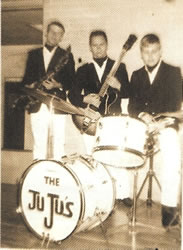 Max Colley, Rod Shepard, Bill Gorski
Max Colley, Rod Shepard, Bill Gorski
The trio managed to throw together another instrumental they called “Flake Out II”, that sounded remarkably similar to the original “Flake Out”, and a hastily arranged version of “Yakety Sax”. Seemingly against all odds and with just a few hours of rehearsal, they were a big hit at the dance. It was the first gig for the three young musicians who would soon become the original JuJus.
Soon after the dance, Bill Gorski bought a set of Ludwig drums that looked like the kit used by Ringo Starr, and the three started learning some other tunes. Max recalls that they began practicing in the Colley garage. They all bought outfits that were a fairly close approximation of the ones worn by the Dave Clark Five, and the group soon got offers to play some small gigs, including a couple of adult parties.
Now that they were going be a working band, they also needed a catchy group name. ‘JuJus’ came from Max Colley’s baby brother, Wally. The little tyke was unable to say Max’s nickname ‘Junior’; so he called his big brother ‘JuJu’ instead. The trio happened to be trying to think of a band name at the time, so they decided to adopt little Wally’s unusual variation of ‘Junior’ as the moniker for the group.
The JuJus were savvy enough to know that the days when sax-driven instrumental bands like the Champs, Johnny & The Hurricanes, the Bill Black Combo, or Michigan’s Royaltones could produce hit records were all but over. They needed to add a vocalist if the band was going to move much beyond playing gigs at Godwin High School.
It was Colley and Gorski who discovered Ray Hummel III singing folk songs at Orwants sandwich shop, just down the street from Bill Ferrell’s music store where Max and Rod Shepard worked part-time. Hummel, who had already graduated from nearby Forest Hills High School, played both guitar and harmonica. Since folk music had also suffered a decline in popularity with the arrival of the Beatles, it wasn’t too difficult for Max, Rod, and Bill to convince Ray to become the singer in the JuJus.
Although he was a folkie, Hummel’s voice was reminiscent of Gerry Marsden, the lead singer of England’s Gerry And The Pacemakers, a British Invasion band who had already charted six hits by the time the JuJus came together. Marsden and his group were a constant presence on Top 40 radio in 1964 and 1965. Gaining a singer like Hummel, who could write original songs, and having musicians with the ability to sound like the popular British bands of the day were big pluses for the JuJus as they were starting out.
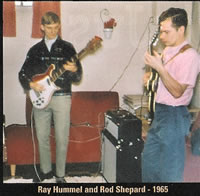 Ray Hummel and Rod Shepard
Ray Hummel and Rod Shepard
After Ray joined the band, Rod Shepard switched over to bass. The JuJus then began practicing in the large Hummel family home until Gorski’s bass drum pedal left a big grease stain on Ray’s parents’ carpet. Hummel’s father was a part owner of H & H Plastics, and he started letting the JuJu’s rehearse there on Saturdays or before a gig rather than create any more messes in his home.
Early on, the band hooked up with a successful and colorful Grand Rapids bail bondsman by the name of Jim Geeting. He became the only real manager the JuJus would ever work with. Geeting, who owned a pistol because of his day job, set up the gigs and put a lot of effort into promoting the band. He always insisted that the band dress as a group, just like the early Beatles. Geeting told the JuJus that it was a lot easier for him to book what he called a “clean band”. Jim then took the guys to Wepmans, a clothing store/tuxedo shop on South Division in Grand Rapids, and got the band the uniforms that they wore in many early appearances and publicity photos.
Rod Shepard reflected in a recent interview that Geeting, who was married, in his thirties, and lived in a large modern home, may have enjoyed living vicariously through the band. Geeting wasn’t a musician, but he wanted to be involved in the burgeoning rock and roll scene. He even took Max, Bill, and Rod along with him “skip-chasing” a few times – tracking down some of Jim’s clients who had skipped bail.
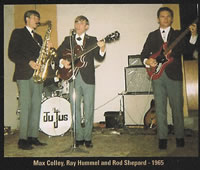 Max Colley, Ray Hummel, Rod Shepard
Max Colley, Ray Hummel, Rod Shepard
But it was their high school band instructor, Bob Traetz, who set up the JuJus’ first real professional job - playing at the Ionia State Hospital for the Criminally Insane. Traetz played in a jazz band that had a gig there, and he arranged for the JuJus to appear as an opening act. In his interview, Rod Shepard jokingly described those who attended their performance at the State Hospital as “an overly enthusiastic, captive audience”.
Another interesting gig for the band was playing at halftime for a Grand Rapids Blazers football game in 1964. It was the fourth and final year for both the Blazers and the United Football League. Unfortunately, the JuJus played on an open air stage, and it rained continuously during their set. Luckily, no one was electrocuted during the performance on an ungrounded stage.
The JuJus played a wide variety of dates including dances at high schools and armories in the Greater Grand Rapids area. They also worked college dances and parties at Western Michigan University in Kalamazoo and Ferris State College in Big Rapids, as well as music clubs like the Elbow Room in Grand Rapids for $150 a night. The JuJus probably played every teen dance club between Saugatuck and Petoskey, including ‘The Ponytail’ ‘The Place’, ‘The Note’, and an atmospheric place in Holland, Michigan, called the ‘Edgar Allen Poe Club’.
They also competed in several ‘Battle Of The Bands’ with other area rivals such as the highly-regarded Soulbenders. The JuJus typically played some of the original songs that Ray was writing, along with cover versions of “Bits And Pieces”, “Hang On Sloopy”, “Get Off My Cloud”, “It Ain’t Me Babe”, as well as several Beatles and Gerry And The Pacemakers’ tunes. Max fondly remembered playing a gig at the Woodland Roller Rink. Afterwards, the JuJus signed autographs and got some girls’ phone numbers. One of those young ladies ended up marrying Colley a few years later.
The dream of almost every young band in the 60’s was to make a record and hear your song on the radio. The JuJus first recording sessions took place during the summer of 1965 at the Great Lakes Recording Studio, situated in the Our Theatre in Sparta, Michigan. Located approximately 15 miles north of Grand Rapids, the studio was run by Dave Kalmbach, a young electronics buff and musician who also played keyboards in the instrumental group Dave and The Shadows. 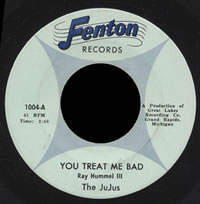
Kalmbach’s studio only operated during the day or late in the evening after the films at the theatre had been shown. His recording equipment was installed in the projection booth, and Dave had the JuJus set up between the screen and the first row of seats with a shield around the drum set to dampen the sound.
Two Ray Hummel originals, “You Treat Me Bad” and “Hey Little Girl”, were released as their first 45 rpm single on the Fenton label. Both songs clocked-in at less than two minutes. The driving “You Treat Me Bad”, with its jangling folk-rock guitar sound was the obvious A-side, but “Hey Little Girl” was also an excellent little tune that featured Max’s saxophone prominently.
Deejay Larry Adderly from station WLAV became fond of “You Treat Me Bad” and promoted the record heavily on his show. The song debuted on the WLAV’s ‘Favorite 40’ in August of 1965 and climbed the chart steadily that fall before finally peaking at # 2, one spot below the Beatles’ # 1 hit, “Yesterday”.
The popularity of “You Treat Me Bad” resulted in what could only be called “JuJu-mania” in Southwest Michigan. Besides being a constant presence on WLAV, the band had been covered in the Grand Rapids Press, and had also appeared on several local TV programs. When the JuJus opened for Chubby Checker at a show in the East Grand Rapids High School gym in late 1965, the kids in the audience were throwing jujube candy and screaming as if the band was the second coming of the Beatles.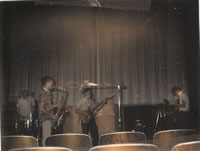 JuJus recording at the Great Lakes Studio in Sparta
JuJus recording at the Great Lakes Studio in Sparta
Another interesting JuJus performance from 1965 was at the Our Theatre in Sparta. Since the band sounded like Gerry And The Pacemakers, Dave Kalmbach came up with the novel idea of having the JuJus play some of the British band’s songs before a showing of the group’s new movie, Ferry Cross The Mersey, at the Our Theatre.
The event was a smashing success, with kids lined up on the streets outside the theatre for blocks to get the band’s autographs and hear them play. Kalmbach had offered the JuJus free recording time in exchange for their performance, and the band recorded two of the Gerry And The Pacemakers’ songs they performed that night (“It’s Gonna Be Alright” and “I’ll Be There”) along with some of Ray Hummel’s originals. None of these songs were released, however, until long after the JuJus had broken up.
The band’s most memorable gig was at Rogers Plaza, the first mall in Grand Rapids. All of the stores in the mall closed for the JuJus’ concert. The mall had constructed a special stage for the band, and Grand Rapids police were stationed in front of it for security. 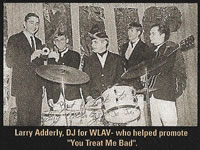
The entire mall was packed with teens. Larry Adderly made a special appearance to present the JuJus with a “gold record” (actually a prop record painted gold) for their big local hit, “You Treat Me Bad”. Shortly after the Rogers Plaza show, Jim Geeting convinced the band that they needed to add a lead guitar player. Rick Stevens was then brought into the band to fill that role.
When Drummond Records out of Detroit entered the picture and offered the JuJus a recording contract, it seemed that the band was primed to make its move. The company was interested in releasing “You Treat Me Bad” nationally, but wanted a commitment from the band that would involve at least one year of touring to promote the record, a follow-up single, and possibly an album.
Everyone was excited about the recording contract with the possible exception of Ray Hummel. Unfortunately, Ray’s fiancé had given him an ultimatum after learning of the contract offer. If he chose to tour with the band for a year, she declared that she would not wait for him. Ray capitulated, and quit the band to get married. Without their lead singer and songwriter, the Drummond offer was pulled off the table. As a result of this major setback, Max Colley also decided to leave the group and enrolled in Grand Rapids Junior College.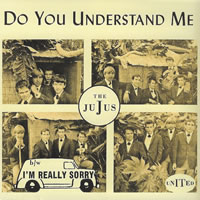
Gorski, Shepard, and Stevens wanted to keep the JuJus going, so they added Brett Wells on lead vocals and Bruce Essex on rhythm guitar. The revised group recorded another single, “I’m Really Sorry”, penned by Rick Stevens, with its flipside, “Do You Understand Me”, written by Stevens and Bill Gorski.
The 45 rpm was issued with a picture sleeve (unusual for a local release) on United Records in 1966. The songs were recorded at Kingtones guitarist Phil Roberts Jr.'s basement studio in Grand Rapids. Despite being an excellent two-sided record, the release suffered from a lack of promotion. But the real reason might have been that the JuJus now sounded like a different band as a result of the loss of two original members, especially Hummell’s distinctive vocals.
Being pressured to quit the band at a crucial juncture was probably the worst way to start a marriage, and Ray Hummel’s lasted less than a year. After his divorce, Ray recruited Max Colley to help him put together a band and record two more of his original songs for another single. They recruited some young musicians from Holland, Michigan, including keyboardist Ray Vasquez from the Legends.
Calling the band the Traffic Jams, their only single, “Fine Day/The Gentle Rain” was recorded at the Great Lakes Recording Studio in Sparta and released on Fenton Records. Although both of Ray Hummel’s songs were of high quality, neither they nor the Traffic Jams connected with area teens like the original JuJus. Hummel realized a little too late that he had let his big chance slip away.
By 1967, the JuJus had lost another original member when Bill Gorski left the band. He was replaced on drums by Ron Homrich. After Bruce Essex and Brett Wells also left the group, Ronn Burke joined the JuJus as the new lead vocalist. Just as it seemed that the wheels might be starting to come off the band, manager Jim Geeting came up with a great idea. Geeting put up the money to open a new teen club in Ludington, Michigan, and called it ‘The Island’.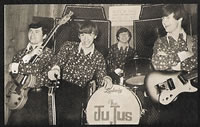
Since Jim’s work kept him in Grand Rapids, he put the JuJus in charge of just about everything at the club. Rod Shepard remembers that summer running the Island as “sometimes a ball, sometimes a great pain, but mostly a ball”.
The JuJus all lived in a dilapidated, rented house, and they played at the club six nights a week. It was Geeting’s idea to book name bands like the Kingsmen and the Electric Prunes into the Island with the JuJus serving as the opening act.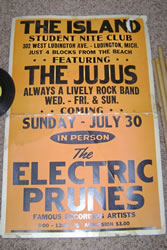
It was a big risk presenting name entertainment in a small market like Ludington, however. Geeting lost money on most of the big shows at the teen club, and he battled the forces at city hall who wanted to shut it down. Rod Shepard summed up the Island experience best when he said, “In the end it worked for us and the kids of Ludington and the surrounding areas who had a decent place to go that summer”.
The JuJus had begun evolving into a band with heavier rock sound when Rod Shepard received his draft notice near the end of 1967. He was the last of the original JuJus, and the band dissolved soon after he left to go into the service.
Ray Hummel has continued to perform and do some recording in the country music field in the decades following his time in the JuJus. Rick Stevens was killed while serving his country in the Air Force in 1969. Ronn Burke currently lives in Grand Rapids and plays in a band called the Natchez Trance. Bruce Essex owned a successful business and is now retired. Sadly, drummer Ron Homrich passed away four years ago.
Max Colley graduated with a degree in music from Calvin College and would follow in the footsteps of his old mentor Bob Traetz as a highly respected high school band director for going on forty years. Max remained very active in music after his stint in the JuJus. He played sax on Al Green’s first album, “Back Up Train”, in the late 60’s when the soul music legend was recording as Al Greene & The Soul Mates in Grand Rapids, Michigan. Colley also formed and played in a group called the Blue Max for many years.
Rod Shepard performed with Colley for six years in the Blue Max after he had been discharged from the service. Shepard, who suffered from arthritis, eventually stopped playing music and sold or donated all of his equipment. Rod moved to California and then Washington. Shepard had kept a box of tapes containing unreleased recordings by the JuJus as he moved across the country. Prodded by his younger sister Kim, Rod met with Michael Greisman who did an outstanding job working with the 40 year-old tapes to make them presentable for their CD release on Cicadelic Records in 2009. Sadly, Shepard passed away a few years later.
In 2009, the JuJus were voted into Michigan Rock and Roll Legends Hall of Fame.
Dr. J. Recommends:
“The JuJus: You Treat Me Bad 1965 – 1967”.
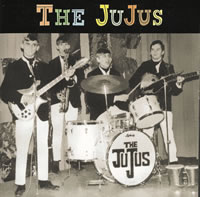 Cicadelic Records CD, 2009. This excellent 23-song set collects almost everything that the JuJus recorded; including both of their singles, Ray Hummell’s single with the Traffic Jams, some alternate takes, unreleased JuJus’ tunes recorded at the Great Lakes Studio, those done with Phil Roberts of the Kingtones at his studio, and some live recordings done in 1967 that feature the final line-up of the JuJus. It also includes a great booklet with lots of photos and an interesting interview with Rod Shepard.
Cicadelic Records CD, 2009. This excellent 23-song set collects almost everything that the JuJus recorded; including both of their singles, Ray Hummell’s single with the Traffic Jams, some alternate takes, unreleased JuJus’ tunes recorded at the Great Lakes Studio, those done with Phil Roberts of the Kingtones at his studio, and some live recordings done in 1967 that feature the final line-up of the JuJus. It also includes a great booklet with lots of photos and an interesting interview with Rod Shepard.

